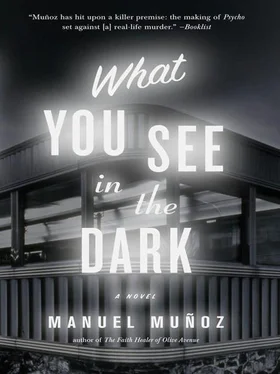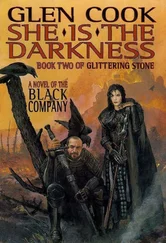“You’re a smart lady. I’m from the Valley, you know, and most people don’t think of this place that way.”
She said nothing in response for a moment, not wanting to reveal much about herself. She had learned to be careful over the years. She studied the back of the driver’s head, his careful concentration on the road. “I was born here,” she finally offered, “over past Fresno.”
“Is that right?” he said, meeting her eyes in the rearview mirror. “I’m from Stockton myself, born and raised.”
“Do you still have family there?”
“Yes, ma’am. My parents are still there, but they’re getting on in years.”
She smiled at him when he glanced at her in the mirror, but did not respond. But the silence wasn’t awkward. He went back to the task at hand; she knew how the studios laid down the law on drivers, on crew, even on extras. She studied the back of his head, a handsome square with a clean line from a fresh haircut. Ever so slightly now, the sedan was beginning to pick up speed, the road taking a gradual slope downward, but she resisted leaning forward again to catch a view.
“I hope you won’t think I’m being nosy,” said the driver, “but I hardly think you’re on your way to do a musical.”
She laughed a little and shook her head. “No, nothing like that. Not in Bakersfield.”
“Well, it is a big music city, you know. Lots of country. I’m sure there’s a good story in there somehow. With a country music star and all.”
“Maybe,” she replied. “But you couldn’t see me as a cowgirl, could you?”
“I sure could!” He was beginning to take his eyes off the road just a bit much for her comfort, but there wasn’t going to be a way to return to the silence of before without seeming rude. She could feel the pull of the road downward. “I tell you what — you’d make a prettier cowgirl than that Elizabeth Taylor.”
“That’s very kind of you to say,” she said, then leaned up to look at the road. They were most definitely on the way down the slope of the Grapevine, but the road curved here and there and the full, unobstructed view of the Valley had yet to come. They went silent again, and she looked once more at the driver’s clean hairline, the square rigidity, and then let her eyes travel briefly down the slope of his shoulder.
This girl is in love with a divorced man and will do anything for him, she’d been told, but the direction had ended right there during the read-through. This girl. A read-through, not a rehearsal. Silently, she had sat at the table with the Director and the other actors and asked herself if she knew what it would be like to love another woman’s ex-husband, but the script said nothing about shame, about moral obligations, nothing about right or wrong. And the Director had long ago put his foot down on any shenanigans about character, about Method, about needing quiet spaces before a scene started: this was a job, not a psychiatric couch.
She pictured running her finger along the edge of the driver’s shoulder and wondered if his eyes would register complicity when they looked up to meet hers in the rearview mirror.
Is that how the European actresses did it, how they lost themselves in their scripted terrors?
You have beautiful eyes, said the woman who had discovered her years ago, a silent-film star. It’s all in the eyes.
“I’m not exaggerating, ma’am. My wife and I both admire you very much, especially in the movies where you sing and dance. You’re an absolutely talented lady. First class! We think you’re just wonderful!”
“Thank you,” the Actress replied, and the moment she said it, she wished she could have given the words more than the note of resignation underneath. She wondered if she had betrayed what she had been thinking just by speaking aloud, and this worried and thrilled her at the same time: it was a private knowledge she wanted to hone, to use during the filming, in order to practice at being a real actress, to use every available tool. Her voice, her eyes, her fluttering tone. That would be all she could control. Everything else, she was beginning to suspect, would be modeled for her.
The driver went quiet again, his eyes back on the road, and she felt sorry for not taking in his pleasure, his willingness to give her praise, even though she had long ago discarded the need for adulation, that small bird singing inside. It was one thing to enter this business for that very reason — she could be honest with herself about that — but it was quite another to let that feeling guide her well-being. She had come from this very Valley to Hollywood as a starlet — a dancer and singer with enough talent not to embarrass anyone — but that was over ten years ago now, and somewhere along the line, she had realized the adoration would not last very long. She should drink it in, every chance she had.
You have beautiful eyes, the silent-film star had told her, as if there were an urgency in using them, as if the silent-film star herself had never noticed anyone taking an indiscreet glance at her lazy eye, drooping a little when she had too much champagne.
“Look,” said the driver. “There’s your view.”
The Actress leaned forward and there it was: the long green Valley flanked on the west by the low coastal hills, over on the east by the towering Sierra, the place she had been born in, had come from, maybe was destined to return to. “Majestic, isn’t it?” she said. “Gorgeous, really.”
“Yes, ma’am. From the Lord’s point of view, everything looks beautiful.”
The road was level, but she could feel the sedan picking up speed. The descent would start soon, and with it the curving roads. She felt her stomach drop heavy for a moment even before they began going down, the Valley beckoning below.
Are you willing to wear only a brassiere for the opening scene? The Director had asked her. It’s important for the atmosphere.
Fruit. Cotton. Oil. The land spread out as far as she could see. The story of the woman would take place in the Valley, but there was no landmark to let the audience know. No leaning tower, no red bridge, no streets of stark white monuments. It was a terrible story to tell.
Ma’am, I know where I can have you fitted for some black brassieres, a wardrobe mistress assured her. Very elegant, very discreet.
The script made no claim on morals, on shame, on right or wrong. But there were white brassieres and black ones, a black purse matched by a white one. What for, if only to signal the audience? Were things ever so clear in real life?
In the story, there was a sister. She kept her clothes on. The Actress wondered about that role, if maybe it wasn’t the one she should be playing.
The road started down, and just as she suspected, her stomach sank. She wanted to lean back into her seat and not look ahead, where the view of the majestic Valley dipped away from their sight, obscured by the hills as the road dove down their descent. The curves began making her feel nauseated and regretful of the orange juice and croissant she’d had for breakfast, but the Actress remained leaning forward, one hand on the bench seat, feeling a little proud of her bravery as the driver negotiated the turns.
The girl will do anything. She steals the money and runs.
She could not ask the Director. She only asked herself, silently. What is it like to love a man who left his wife, who is still angry at her? What is it like to steal money? What is it like to run? What is it like to know you’ve made an error, to know you’ve acted in complete haste? What is it like to have a police officer arrest you? What is it like to know there might not be a turning back?
Would she do anything?
Читать дальше












